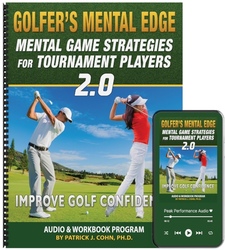
All the Different Emotions You Experience During Golf
Golfers experience a wide range of emotions: angry and joyful, frustrated and calm, anxious and excited, disappointed and proud, fearful and confident, disgusted and motivated, etc.
If you allow your emotions to take over your game, your performance will be dictated by how you feel.
From our Golf Mental Game Survey, we received the following question:
“How can I stop negative thoughts and emotions about poor shot execution and outcomes during a competitive round of golf?”
For some golfers, the result of each shot changes how they feel. These golfers ride the rollercoaster of emotions, affecting subsequent shots.
For example, if you start a round with birdies on the first two holes, you feel excited and think, “This is going to be my best round ever. I feel really good.”
On the fifth hole, you were set up for birdie again but missed a three-foot putt and eventually bogeyed the hole. You feel agitated but still in control.
You are still on target for shooting one of your lowest scores. On the eighth hole, you slice the ball, which lands out of bounds.
You become angry, thinking, “I’m so pissed off. I knew this would happen. I can never get through the front nine without messing up.”
You double-bogey the hole, and your game spirals downward. You feel deflated, frustrated, and angry for the rest of the round.
But emotions don’t pop up randomly. Emotions are responses to your thoughts. If you change what thoughts you focus upon, you will experience a different emotion.
Let’s go back to the previous example…
When you slice a shot on the eighth hole, instead of focusing on the outcome or “I can never get through the front-nine without messing up,” you can think about how you will recover or your strategy for the hole.
You may still feel some negative emotions, but the intensity of those emotions won’t affect your play.
In a 2023 press conference, Rory McIlroy discussed how to deal with the ups and downs during a competitive round of golf.
“I think the best way to deal with that is not let yourself get to that level of expectation so early, right? I take what the golf course gives me and hit good golf shot… and have a little bit more acceptance. Since Augusta, the level of acceptance hasn’t been where it needs to be,” McIlroy said.
Acceptance is a sound strategy to process mistakes, unfavorable weather conditions, and inopportune circumstances. Acceptance is not, “I am playing poorly. I need to accept that I will play poorly for the rest of the round.
Instead, acceptance is recognizing there is nothing you can do about past shots, mistakes, or unlucky bounces. Those have already happened, and you cannot turn back time. However, you can focus on what is happening in front of you.
Get the monkey off your back by focusing forward on your next shot. Avoid being self-critical and minimize the impact of unproductive thoughts.
Since negative emotions flow from your thoughts, you must take back control of your thinking.
Acceptance is a mental strategy to manage your emotions during a round…
The acceptance strategy consists of asking yourself three questions:
- Can I do anything about what has already happened?
- What can I control right now?
- How will I play my next shot?
Keep in mind that you can’t get the bogey or double bogey back. It’s in the past, you can only move on.
Related Golf Psychology Articles
- The Instant Gratification Trap and Its Negative Effects on Performance
- How to Deal With Negative Emotion
- How Ally McDonald Overcame Negative Thoughts to Win
- Subscribe to The Golf Psychology Podcast on iTunes
- Subscribe to The Golf Psychology Podcast on Spotify
Golfers Mental Edge Program

“The Golfer’s Mental Edge 2.0” is new in 2021. This audio and workbook program helps you overcome a lack of focus, low self-confidence or other mental game obstacles on the course that prevent you from reaching your true potential in golf. Learn the secrets to better focus, confidence and composure that Junior, Collegiate and Tour Professionals use to WIN!